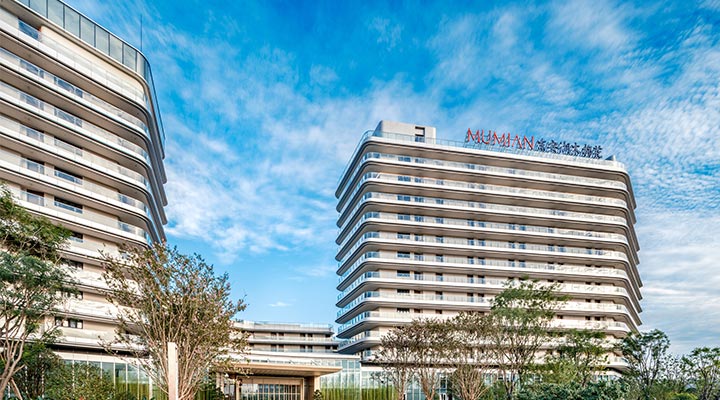Hotel Kapok Sets New Smart Hospitality Standards Using Huawei's FTTO Solution
This site uses cookies. By continuing to browse the site you are agreeing to our use of cookies. Read our privacy policy>
![]()
Enterprise products, solutions & services
Founded in 2003, Hotel Kapok — a boutique business hotel brand owned by the property developer China Resources Land (CR Land) — can, today, be found in many Chinese cities, from Beijing to Shenzhen, Chengdu to Hangzhou. From bustling business districts to busy airports and even the site of 2022's Asian Games, this hotel chain caters to guests from all over the world, delivering a personalized service concept that breaks the traditional model, setting new standards in the hospitality industry.
With the rapid development of new technologies, such as the Internet of Things (IoT) and big data, CR Land sees the business benefits of such innovation very clearly. As such, it integrates multiple platforms — covering hotel and Operations and Maintenance (O&M) management, along with Building Information Management (BIM) allied to intelligent hotel devices — using smart speakers controlled by an app, for example, to improve the check-in experience of guests, while also boosting operational and management efficiency through the use of Information and Communications Technology (ICT).
Smart hotel operations are built on true gigabit all-optical networks.

Given the current global focus on carbon neutrality goals, green and low-carbon operations are now recognized as key objectives across diverse industries. The hospitality industry is no exception in this regard. CR Land was looking to upgrade Hotel Kapok to green and sustainable networking, where network architecture, performance, capacity, reliability, and technology all support sustainable development over a span of 10 to 15 years.
The company turned to Huawei's Fiber To The Office (FTTO) solution to achieve its goals, which uses passive splitters to replace active switches, doing away with the need for Extra-Low Voltage (ELV) equipment rooms. Compared to traditional solutions, the solution slashes carbon emissions by 60%. The life cycle of the fibers used extends to 30 years, four times the length of traditional network cables. This supports network evolution over that timeframe, eliminating the need for any future re-cabling and supporting sustainable development in the long term.
With guest numbers rising, CR Land has ambitious future plans for Hotel Kapok: it's actively looking to provide more and more advanced services. Indeed, given rapidly growing demand for new media, remote office, and live videoconference services, all hotels now need to be able to call upon a high-quality and stable network to meet diverse network access needs.
Tidal traffic is commonplace in hotel and conference rooms. With the peak hours of Internet access in guest rooms running from 18:00 to 23:00, Huawei's FTTO solution extends fibers to individual rooms, deploying a gigabit Optical Network Unit (ONU) in each one. This means that, even during those peak hours, a premium gigabit access experience is guaranteed for all guests.
As intelligent hotel IoT applications also develop at pace, the number of smart terminals and bandwidth requirements is only set to rise. Fibers set no limits in terms of bandwidth and coverage distance. With simplified point-to-multipoint architecture, the FTTO solution supports flexible on-demand capacity expansion in the short term and evolution from gigabit to terabit speeds in the long run. All of this, to repeat the point, with no need for re-cabling, effectively protecting the investment made and supporting sustainable development for smart hotels.
Hotels, of course, provide a suite of services, from a range of in-room appliances and wireless and wired Internet access, to Video on Demand (VoD), Plain Old Telephone Service (POTS), and cable television. All use different terminals that require different types of cables, obviously enough, making deployment complex and future expansion potentially a headache. Nonetheless, as hotels become smart, a huge volume of new, smart devices and sensors will need to be connected to the network, both wired and wirelessly, in order to support Internet access, logistics services, the intelligent management of public facilities, and hotel operational and office needs. This makes an integrated network, capable of carrying wired and wireless services, essential, one with simplified cabling to boot.
Huawei's FTTO solution, which carries multiple services to each room over a single fiber, replaces a minimum of six copper lines used in traditional solutions, vastly simplifying cabling. Indeed, the solution cuts the volume of materials required, along with cabling costs, by 90%. With this single network carrying multiple services, from office and voice services to security protection, ONUs are plug-and-play and can be replaced immediately if a fault occurs. This Passive Optical Network (PON) is maintenance-free and a single person can operate and maintain an entire campus network, simplifying O&M and reducing labor costs by 70%.
With green, simplified, and innovative architecture, Huawei's FTTO solution — to summarize — offers significant advantages in terms of bandwidth, coverage distance, O&M costs, and service life. It meets the development requirements of Hotel Kapok in terms of IoT and Ultra-High Definition (UHD) video services and is rapidly being recognized as a new construction standard for hotels. Currently, the solution has been deployed at Hotel Kapok sites in the cities of Chengdu and Rizhao and, in the future, more sites will surely follow suit, ushering in digital transformation.